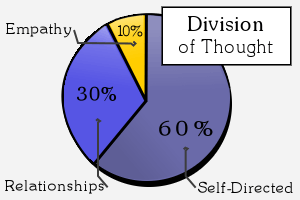By keeping in mind these rules, you can avoid repeating the same mistakes. Rule One: People Mostly Care About Themselves People aren’t thinking about you. A damaging myth to buy into is believing the amount of time you think of yourself compares to the amount of time others think of you. In reality they are nowhere close. Take a look at this chart:
I’ve used this example before but I believe it deserves repeating. Take a look at the different slices of this chart. The biggest is the time you spend thinking about yourself. The second is the time spent thinking about relationships, but how they affect you. What does Julie think of me? Will my boss give me a raise or fire me? Do my friends respect me or just tolerate me? Only a tiny sliver is devoted to empathy. Empathy is the rare occasion where you think through the perspective of another person. When I’ve discussed these ideas previously, many people argue I’m being far too generous with my chart. In reality that sliver is probably even smaller. This means that you occupy only a tiny percentage of a persons thoughts. Waiting for people to invite you, becoming embarrassed at a minor faux-pas or emphasizing what others think of you come from failing to use this rule. Almost all people are far too self-absorbed to notice. Rule Two: People are Motivated by Selfish Altruism To say all behavior is strictly selfish would be misleading. It fails to account for acts of charity, ethics and why people don’t just cheat, swindle and lie all the time. Selfish altruism is a broader category that covers why people do nice things as a way to get what they want. By studying primates, researchers noticed four main categories of selfish altruism. I believe they are the same categories we use, even if slightly more sophisticated: By looking through this lens of selfish altruism, you can better make decisions. Viewing people as completely uncaring or selfish is incomplete. But expecting people to think of you constantly and do nice things for free is dangerous. Rule Three: People Don’t Think Much I believe we drastically overestimate what we do intentionally. Subconscious patterns, environmental stimulus and programmed reflexes occur frequently, even if we later take credit for them. The conscious mind is a relatively new addition to the human operating system. And it’s been designed to cleverly take credit for a lot of decisions it doesn’t really make. If someone asks you to be unbiased in making a decision, it is probably best to just laugh. The implication of this is that appealing entirely to thoughts won’t work. Since a bulk of decision making is made in the background, you need to target that background if you want to be influential. You don’t need to be manipulative, just smart enough to recognize that snap judgments mean a lot and your communication is more than just words. Rule Four: Conformity is the Norm You become your environment. Uniqueness and individuality tend to warp to fit the people around you. This is true of other people as it is for yourself. It means you should be careful who you pick as friends, partners and colleagues. This is why I believe it is important to keep a varied social group. When you interact with people from completely different backgrounds, beliefs and behaviors on a regular basis you are more likely to see different perspectives. This also means you have more control in picking who you want to be. Applying the Four Rules Here are some applications of these rules you might want to consider:
What layers are you communicating with? If people are selfish, self-absorbed and fail to think much, just working on the words you use isn’t enough. Everything about you is communicating something, and unless you get that message straight, the most persuasive argument won’t win anyone over. Give reminders. Although some people are meticulously organized, most aren’t. Give people the reminders they need so you don’t get left out unintentionally. What’s your social value? This isn’t your worth as a person, but what you have to offer in terms of other peoples needs and wants. It is easy to get depressed about human issues, if you don’t see the calculations behind it. Improve the value you offer and you can access the selfish altruism in us all.

